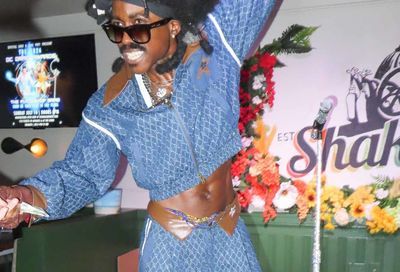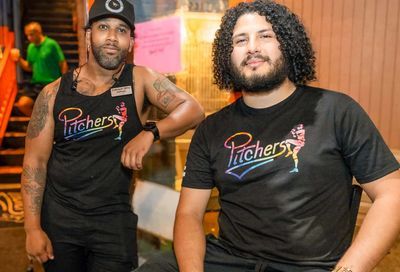Moffie review: Gay South African military drama misses the mark
Tension and testosterone dominate the handsomely-produced but short-sighted South African gay soldier drama "Moffie."

A film about strapping, young recruits to South Africa’s Apartheid-era all-white military might be expected to offer moral complication along with its sympathetic portrayal of a family’s firstborn sent to train for war. But Moffie (★★☆☆☆), directed by South African filmmaker Oliver Termanus, carves out a fairly flat portrayal of Nicholas van der Swart (Kai Luke Brümmer), who leaves for his compulsory military service an innocent, middle-class teen and basically returns that way.
Adapted from the autobiographical novel by André Carl van de Merwe, the film opens strong with a Kubrickian air of unease, stoked by Braam du Toit’s bass string-heavy score. It’s 1981, so Nicholas, and every other able-bodied white man over 16, must join in the fight against Communist-backed Angolan forces at the nations’ then-border.
The rowdy young men who pack the train with him, headed for the base at Middelburg, might be no different from any other group of anxious teen dudes, set loose from home, pumped for battle yet afraid of what lies ahead. But these boys are being primed to go defend their land from “Black savages” at their doorstep. The fit, fair-haired sons of a cruel system of racial oppression, Nick and his comrades will be made into weapons of Apartheid — not that he expresses thoughts about, or any relationship to, the idea.

Rather, he’s consumed with his private struggle to understand and accept his sexuality. Military service is merely a trial to be endured, like the homophobia he witnesses all around him but is careful to elude by remaining closeted. Catching the eye of sensitive, playful recruit Stassen (well-played by Ryan de Villiers), Nicholas experiences romance and danger, but mainly bears witness to others’ pain and loss.
Hermanus bores into the brutal yet homoerotic culture the boys are thrown into, with scenes of bare-knuckle brawls in the barracks, slow-mo strolling to “Summer Breeze,” and Nicholas watching his crush play volleyball shirtless. And, yes, since we’re now thinking of Maverick, Iceman, beach volleyball, and Top Gun, it’s worth pointing out that Maverick was a military recruit with more intriguing moral ambiguity than this here Nicholas.
The aggressive anti-gay rhetoric, violence, and institutional harm inflicted on the gay recruits who are found out might be intended to draw parallels between the mistreatment of two different marginalized communities in South Africa. The comparison doesn’t hold up, based on what’s seen through our protagonist’s eyes. When that trainload of unruly recruits cheer on one of their racist brethren while he taunts and assaults an elderly Black man (Israel Ngqawuza), Nicholas watches. He doesn’t participate, but never reckons with the moment either.
The movie leaves that unfortunate victim standing in quiet, powerless dignity on the train platform, and doesn’t revisit the nation’s racial history. The boys are savages of a sort, the film seems to say, but don’t blame them for perpetuating the culture that raised them. Nicholas makes it through wartime service — spoiler alert, this is an autobiographical novel — not unscathed, but on his own two feet, and free to move forward in ways that elderly man would never have been allowed. Visiting a friend’s beach townhome after the war, Nick declares, “It’s paradise.” It certainly wasn’t for everybody, and it would have been nice to see our hero Nick really comprehend that.
Moffie is available starting April 9 in theaters, on-demand, and digital. Visit www.moffie.movie/watch-at-home.
Read More Reviews:
HBO’s ‘Tina’ offers a candid look at the life of a legend
Netflix’s “The Irregulars” puts a supernatural spin on Sherlock Holmes
Support Metro Weekly’s Journalism
These are challenging times for news organizations. And yet it’s crucial we stay active and provide vital resources and information to both our local readers and the world. So won’t you please take a moment and consider supporting Metro Weekly with a membership? For as little as $5 a month, you can help ensure Metro Weekly magazine and MetroWeekly.com remain free, viable resources as we provide the best, most diverse, culturally-resonant LGBTQ coverage in both the D.C. region and around the world. Memberships come with exclusive perks and discounts, your own personal digital delivery of each week’s magazine (and an archive), access to our Member's Lounge when it launches this fall, and exclusive members-only items like Metro Weekly Membership Mugs and Tote Bags! Check out all our membership levels here and please join us today!

























You must be logged in to post a comment.